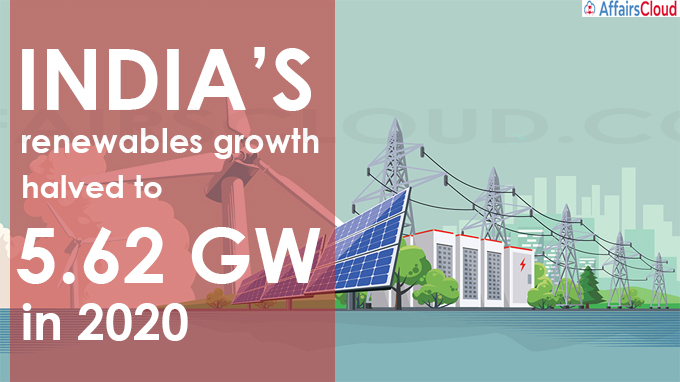 According to the new report ‘Renewable Energy Market Update – Outlook for 2021 and 2022’ released by International Energy Agency (IEA), India’s Renewable Energy capacity addition declined by almost 50% to 5.62 GigaWatts (GW) in 2020 (compared to 2019).
According to the new report ‘Renewable Energy Market Update – Outlook for 2021 and 2022’ released by International Energy Agency (IEA), India’s Renewable Energy capacity addition declined by almost 50% to 5.62 GigaWatts (GW) in 2020 (compared to 2019).
i.The decline in capacity addition in India has been attributed to the COVID-19 pandemic.
ii.India’s 5.62 GW capacity addition in 2020 includes large and small hydropower.
- The primary challenge to renewable energy deployment in India is the financial health of distribution companies.
- The report stated that India will add 17 GW renewable capacity in 2021.
- India has a renewable capacity of around 95 GW including small hydro and biomass.
Global Projections
i.At the Global level, the annual renewable capacity additions increased 45% to almost 280 GW (up from 190 GW in 2019), which is the highest year-on year increase since 1999.
- China alone accounted for more than 50% of the green energy projects built in 2020.
- The 280 GW renewable energy capacity addition in 2020 comprised primarily Solar – 135 GW, Wind – 115 GW, Hydro – 20 GW, and 10 GW of other renewables.
ii.IEA has projected Renewable Energy Capacity additions of 270 GW in 2021, followed by 280GW in 2022.
- Of which, China’s contribution will be 45% in 2021 and 58% in 2022.
iii.Solar PV development is expected to break records in 2022, with annual additions reaching 162 GW.
iv.Around 90 percent of the new power capacities across the world in 2021 and 2022 will be of renewable energy. Amongst these, solar and wind energy will continue to dominate. The hydroelectric capacity is estimated to reach 30-35GW in 2021 and 2022, and other renewable sources may stay around the 10GW mark.
Recent Related News:
i.February 10, 2021, According to IEA’s “India Energy Outlook 2021”, India will surpass European Union as the world’s third-biggest energy consumer by 2030.
About International Energy Agency (IEA)
Executive Director – Dr Fatih Birol
Headquarters – Paris, France
Members Countries – 30 member countries and 8 association countries




